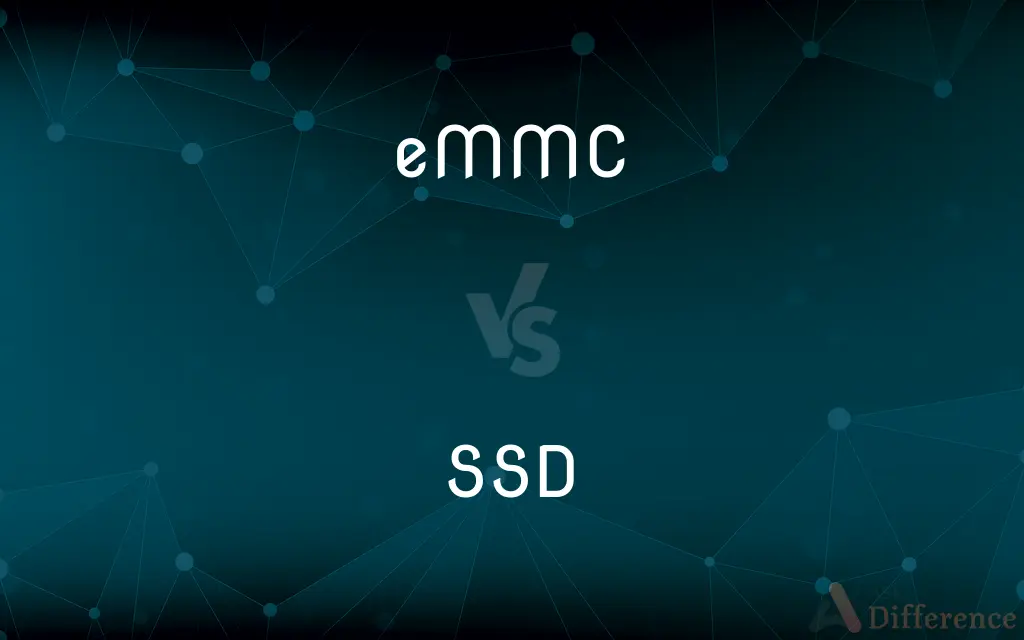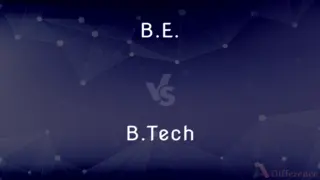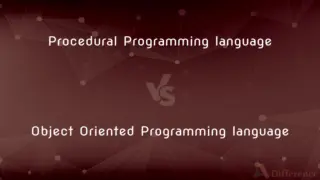eMMC vs. SSD — What's the Difference?
By Tayyaba Rehman & Fiza Rafique — Published on February 2, 2024
eMMC is a type of flash storage found in budget devices, offering moderate performance. SSDs are faster, more reliable storage solutions used in higher-end devices.

Difference Between eMMC and SSD
Table of Contents
ADVERTISEMENT
Key Differences
eMMC, or embedded MultiMediaCard, is a type of NAND storage commonly used in smartphones, tablets, and other budget-friendly devices. It integrates the storage device with the controller in a single package, leading to a compact and cost-effective solution. eMMC is known for its decent performance in everyday tasks but doesn't quite match the speed and reliability of Solid State Drives (SSDs).
Solid State Drives (SSDs) represent a significant advancement in storage technology, leveraging NAND flash memory but with a more sophisticated controller compared to eMMC. SSDs are used in a broad range of devices, from laptops and desktops to servers, due to their superior speed, durability, and energy efficiency. The architecture of an SSD allows for faster data access and transfer, making it a preferred choice for performance-oriented applications.
While eMMC storage is soldered directly onto the device's motherboard, limiting upgrade possibilities, SSDs come in various form factors, such as 2.5-inch, M.2, and PCIe cards, offering flexibility in use and the potential for upgrades. This modularity makes SSDs a versatile option for a wide range of computing needs, from consumer electronics to enterprise-grade servers.
The performance gap between eMMC and SSD becomes evident in tasks involving large data transfers or high-speed operations. eMMC might suffice for basic computing needs and light applications, but SSDs excel in demanding environments, offering rapid boot times, quick application launches, and efficient data processing capabilities.
Cost is another differentiating factor; eMMC is generally more affordable, making it a common choice for budget devices where cost constraints are a priority. SSDs, on the other hand, command a higher price but justify it with their performance and reliability, making them a worthwhile investment for users seeking enhanced computing experiences.
ADVERTISEMENT
Comparison Chart
Storage Capacity
Typically up to 256GB
Ranges from 128GB to several TB
Performance
Moderate read/write speeds
High read/write speeds
Use Cases
Budget smartphones, tablets, entry-level PCs
High-performance laptops, desktops, servers
Upgradeability
Not upgradeable, soldered onto the motherboard
Easily replaceable or upgradable
Cost
Generally more affordable
Higher priced, reflecting performance benefits
Compare with Definitions
eMMC
A soldered storage solution limiting upgrade options.
The device's eMMC storage can't be upgraded due to its design.
SSD
A versatile storage device available in various form factors.
The M.2 SSD offers a compact yet powerful storage solution.
eMMC
A compact, cost-effective flash storage solution for portable devices.
The tablet's 64GB eMMC storage is sufficient for casual use.
SSD
A storage upgrade improving system responsiveness and performance.
Installing an SSD made the software run much smoother.
eMMC
Embedded storage common in entry-level devices.
Smartphones often use eMMC for their internal memory.
SSD
A flash-based storage solution surpassing traditional HDDs in speed.
The SSD in the gaming PC supports quick game loads.
eMMC
A NAND flash storage format for affordable devices.
The eMMC memory in the camera stores photos and videos.
SSD
A high-speed, reliable storage device without moving parts.
The laptop's SSD dramatically improved its boot time.
eMMC
Integrated storage and controller for budget electronics.
The eMMC in the budget laptop offers 128GB of space.
SSD
Solid State Drive, offering rapid data access and durability.
Upgrading to an SSD is a game-changer for older computers.
Common Curiosities
What is an SSD?
An SSD is a high-speed storage device known for its durability, lack of moving parts, and superior performance compared to traditional hard drives and eMMC.
Can eMMC be upgraded?
Typically, eMMC is soldered onto the device's motherboard, making it non-upgradable.
What is eMMC?
eMMC is an affordable, integrated storage solution used in budget devices, offering moderate performance and storage capacity.
Is an SSD suitable for gaming?
Yes, SSDs can significantly improve gaming performance by reducing load times and providing quicker access to game data.
Can SSDs fail or wear out?
Yes, like all storage devices, SSDs can fail eventually, but they typically have a longer lifespan and better reliability than traditional hard drives.
What are the disadvantages of eMMC storage?
eMMC has lower performance and endurance compared to SSDs, making it less suitable for demanding tasks.
Is eMMC storage upgradeable?
In most cases, eMMC storage is not upgradeable, as it's integrated into the device.
What are the advantages of eMMC storage?
eMMC is cost-effective, power-efficient, and suitable for basic storage needs in smaller devices.
Is eMMC more durable than traditional hard drives?
eMMC, being a type of flash storage, is generally more durable than traditional hard drives because it has no moving parts.
Are SSDs more expensive than traditional hard drives?
SSDs are generally more expensive per gigabyte than traditional hard drives, but their prices have been decreasing over time.
Can SSDs be used in servers and data centers?
Yes, SSDs are commonly used in servers and data centers for their speed and reliability, especially in enterprise-grade applications.
What are the advantages of SSDs?
SSDs provide faster data access, better reliability, energy efficiency, and quieter operation compared to traditional hard drives.
Are there different types of SSDs?
Yes, there are various types of SSDs, including SATA SSDs, NVMe SSDs, and PCIe SSDs, each offering different levels of performance.
Is eMMC suitable for gaming?
eMMC may not provide the best gaming experience due to its lower read/write speeds and capacity limitations.
Share Your Discovery

Previous Comparison
B.E. vs. B.TechAuthor Spotlight
Written by
Tayyaba RehmanTayyaba Rehman is a distinguished writer, currently serving as a primary contributor to askdifference.com. As a researcher in semantics and etymology, Tayyaba's passion for the complexity of languages and their distinctions has found a perfect home on the platform. Tayyaba delves into the intricacies of language, distinguishing between commonly confused words and phrases, thereby providing clarity for readers worldwide.
Co-written by
Fiza RafiqueFiza Rafique is a skilled content writer at AskDifference.com, where she meticulously refines and enhances written pieces. Drawing from her vast editorial expertise, Fiza ensures clarity, accuracy, and precision in every article. Passionate about language, she continually seeks to elevate the quality of content for readers worldwide.















































